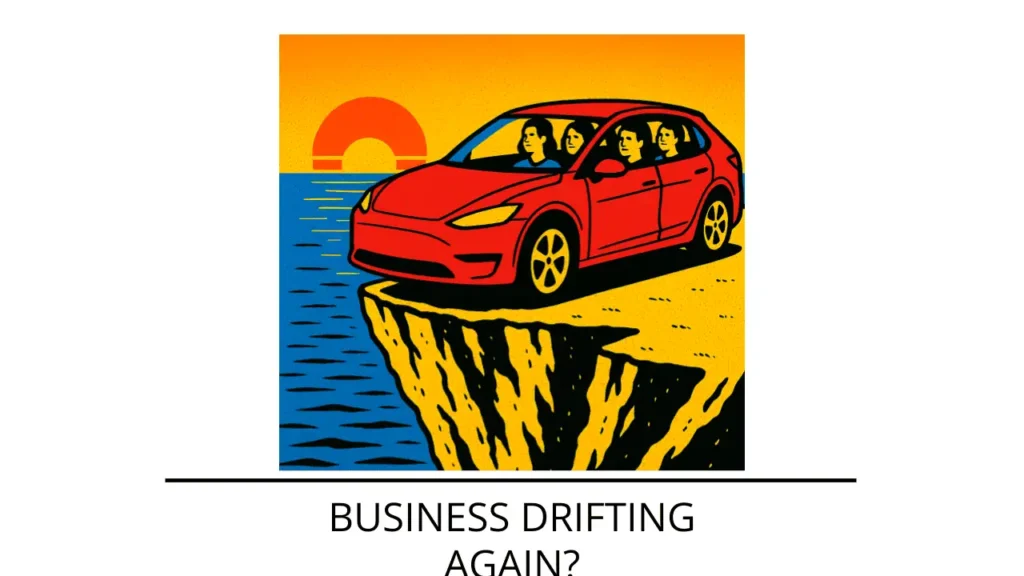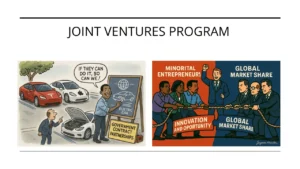In his provocative work Outwitting the Devil, Napoleon Hill reveals one of the most insidious forces that keeps individuals from achieving success: the Master of Procrastination. This concept, which keeps you stuck in indecision, is not just a matter of poor time management—it’s the result of a deeper issue: a lack of discipline in thought and action. It’s a force that pulls businesses into a dangerous state of “drifting,” where the business, like a ship without a rudder, is blown off course by whatever gusts of wind come its way. But how can you tell if your business is drifting—and more importantly, what can you do to course-correct before it’s too late?
5 Signs Your Business Is Drifting
- Lack of Clear Vision or Purpose
Hill’s Outwitting the Devil discusses the destructive power of a “drifter”—someone who has no clear direction, no definite purpose. This is true for businesses as well. When your business lacks a clear mission, it drifts aimlessly, reacting to circumstances rather than proactively moving toward defined goals. If you’re uncertain about where you’re heading, it’s time to reexamine your mission and vision. “If you think you can, or you think you can’t. You are right!” - Procrastination and Delayed Decisions
In Think and Grow Rich, Hill describes procrastination as one of the most paralyzing forces for entrepreneurs. It stems from fear and indecision—traits that lead to stagnation. If you’re finding yourself continually postponing important decisions, you’re caught in the web of procrastination. The Master of Procrastination keeps you stuck in this cycle, where each delay compounds the problems. “Don’t skip the daily foundation routine too important to success.” Success doesn’t happen without consistent, focused action. - Disengaged Team and Low Morale
When leaders are drifting, so are their teams. In Outwitting the Devil, Hill explores how the Devil uses fear, doubt, and indecision to manipulate people into inaction. In a business, this results in a disengaged team—employees who don’t feel motivated to take ownership of their roles or contribute their best efforts, leading to low morale and reduced productivity. - Constantly Putting Out Fires
When your business feels like it’s always reacting to crises—whether it’s customer complaints, vendor issues, or financial shortfalls—you’re likely experiencing the consequences of drifting. Hill calls this reactive behavior a byproduct of indecision. Constantly “putting out fires” drains energy and resources, leaving little room for growth and strategic planning. - Lack of Accountability
Accountability is what kept me on track to bike cross-country. In Think and Grow Rich, Hill stresses the importance of taking personal responsibility for your success. Without accountability, your business loses its sense of direction and purpose. This can cause both leaders and teams to drift, reacting to whatever external forces they encounter instead of pursuing the business’s vision with purpose and intention.
The Problems of Drifting: Consequences on Results and Cash Flow
When a business is drifting, its results will inevitably reflect that lack of focus. As Hill warns in Outwitting the Devil, “Drifters” are easily swept into cycles of inefficiency and mediocrity. But the impact isn’t just philosophical—it shows up in hard metrics: results and cash flow.
- Inconsistent Results
Without a clear strategy or focused effort, businesses suffer from sporadic, unpredictable results. Drifting means that no one is measuring or tracking meaningful progress toward business goals. Without consistent direction, key performance indicators (KPIs) become irrelevant, and the business ultimately stagnates. - Cash Flow Instability
A lack of financial discipline is another symptom of drifting. When you’re not actively managing cash flow, forecasting, and setting financial priorities, you’ll be caught off-guard by revenue shortfalls, mounting expenses, or cash flow issues. Drifting leads to a reactive, firefighting approach that prevents businesses from establishing a healthy financial foundation. - Missed Opportunities
Just as the Devil in Outwitting the Devil tempts individuals to remain complacent, businesses that drift fail to capitalize on new opportunities. These could be emerging markets, innovations in product or service offerings, or changes in consumer behavior. Without focus, businesses miss these moments and watch competitors take the lead.
Solutions: Ashton Hall-Inspired Routines to Regain Control
To break free from drifting, businesses need to adopt routines that promote consistent action, accountability, and discipline. Inspired by Ashton Hall’s emphasis on disciplined, high-value routines, here’s how you can regain control of your business:
- Implement a Daily Routine of Reflection and Planning
Each day should begin with a clear focus. As Ashton Hall advocates, set aside time for self-reflection and to plan the day’s most important tasks. When you make deliberate choices each day, you create momentum and clarity that counters the drifting mindset. This could be something as simple as identifying 3 top priorities for the day and tackling them first. - Focus on One Task at a Time (Deep Work)
Hill emphasizes the importance of focused thought and effort in Think and Grow Rich. In the same vein, Ashton Hall advocates for “deep work”—dedicated, uninterrupted time to work on high-value tasks. By committing to one key task at a time, you avoid distractions and create significant results without falling into the trap of “busy work.” - Strategic Weekly Team Meetings
Accountability is key to overcoming drifting. Hold weekly strategic meetings with your team to review progress and align everyone with the business’s mission. Use these meetings to set clear expectations, assign ownership, and identify obstacles to progress. This ensures that everyone is moving toward the same objectives and prevents the team from drifting. - Monitor Financial Health Regularly
Drifting businesses often ignore their financial health until it’s too late. Implement a system for regular financial reviews, including cash flow forecasts, revenue projections, and expense tracking. Just like Ashton Hall’s focus on financial clarity, this proactive approach ensures that you’re never caught off guard by financial instability. - Implement a Strong Accountability Framework
In Think and Grow Rich, Hill stresses the importance of personal responsibility. To instill this in your team, implement an accountability framework that clearly defines roles, expectations, and outcomes. Whether it’s weekly check-ins, progress reports, or performance metrics, make sure everyone in the business knows that they are accountable for driving success.
In Outwitting the Devil, Napoleon Hill writes, “The fear of poverty is the Devil’s greatest weapon.” But the real weapon the Devil uses, as Hill explains, is procrastination—a weapon that keeps us stuck in indecision and inaction. By recognizing the signs of drifting and taking deliberate, focused action, you can overcome procrastination and refocus your business on its mission.
Don’t let your business drift any longer. Implement these strategies, stay accountable, and ensure your team is always moving toward a clear and prosperous future. “Don’t skip the daily foundation routine too important to success.”
If you want our team’s help to implement solutions to your drifting problem, call or email me directly at:
Jaysum Hunter
Managing Partner
Email: jaysum@575asm.com
Phone: (312) 639-4050







